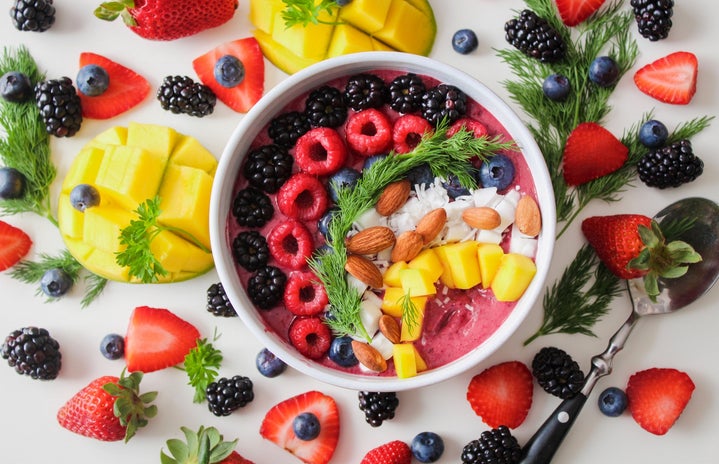“…Period” is back! Check out my author page to catch up/refresh on all of my previous installments. After having a period with cramps that knocked me out (literally) and receiving no conclusive answers as to what is wrong after a series of doctor’s appointments, what’s next? Eating.
We always hear that food is fuel and that we should take more care with what we eat. It can be really annoying when sometimes you just want a slice of disgustingly rich chocolate cake or to eat a whole bag of hot cheetos in one sitting. It can also be hard to digest having to edit what you eat for the sake of your health in a society that loves to body shame.
Women’s health (for anyone with a uterus) can only complicate this further—oftentimes menstruation issues are brushed off on the account that the patient’s BMI is too high. Losing weight, diet, exercise are all things that people hear in response to complaints about difficult menstruation symptoms. It’s used as a catch-all, shaming net to dismiss women and project patriarchal male standards onto them. Not to mention, BMI isn’t even a credible form of measurement.
All of this made me hesitant to change my diet for my period. I was worried I would get into the wrong mindset and focus on aesthetics rather than health. But, this was also my last option. While my gynecologist said nothing about my weight, which I was very thankful for, she also said nothing about next steps.
So, how do you go about dieting for your uterus? Well, there’s actually a lot online. There is an actual PCOS diet as well as many suggestions for endometriosis dieting. I found many articles, some from medical sites and some personal experiences, that informed my choices. I took note of the most common things to pop up across these different resources.
It’s not all omissions, either. There are additions to be made as well, making this process feel less like a diet, and more like altering what I eat. Reframing this sensitive internal conversation as an exchange, a well-rounded edit of what I consume, has helped me avoid thinking about this as a diet which innately has the connotation of losing weight.
I’m taking this slow, too. I take something out, give it a month or two, and then add something in and repeat. I have the luxury of snail speed because I am on a birth control schedule where I only get my period every 12 weeks, and some of you may not have that time. Go at your own speed! This is your journey and you have the ability to do it the way that you want.
First, I added supplements! I try to be good at taking multivitamins every day anyway, but the first thing I changed about my consumption was adding in turmeric and cranberry capsules. Turmeric contains anti-inflammatory antioxidants which is super helpful for just existing. In addition, cranberry supplements are great for urinary health and I’ve noticed my bladder is affected by menstruation and cramps. Together, they act as a constant way for me to maintain my uterus when it isn’t shedding.
Then, I reduced my red meat consumption. This is because apparently red meat can produce more estrogen in the body, which worsens cramps. I have noticed the few times that I have eaten beef since I decided to not eat it, I will have some gentle, background cramps the next day. I haven’t noticed the same thing with pork, which was lumped in as a red meat in the articles I found, but I still try to stay away.
After, I put effort into upping the fruits and vegetables in a rainbow of colors. When nutrition experts say colorful fruits and veggies, they mean it! Listen to them! An array of colors means different vitamins, antioxidants, and general good things for you. Spinach, blackberries, and pink grapefruits are my favorites.
Upcoming is a reduction of trans fats. This would be processed foods completely ousted from my life. This is going to be tough, and something that I either have to go all in on or take super slowly, but for now I am emotionally preparing for this change.
What is most important is listening to your body! If you want to binge on ice cream for emotional support during particularly bad cramps, go for it. It is best to find a balance in treating yourself while also taking care of yourself.


